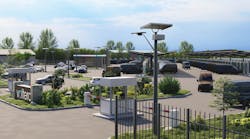Turnkey charging infrastructure solution offers fleets an EV future at scale
Voltera wants to be a turnkey EV charging solution provider for fleets exploring clean transportation, CEO Matt Horton told FleetOwner on the eve of his company’s Aug. 9 launch.
Its services include charging site identification and acquisition, power procurement, facility design and construction, charging hardware deployment, operations and maintenance. In addition, the company provides EV charging facilities as a service, taking on the capex so customers can focus their capital on their businesses.
See also: Charging ahead on infrastructure
“We have the capability to build out the infrastructure,” Horton said. “But we do need early engagement from the fleets. So far, we see that from some of the most progressive and engaged fleets. But now that we’re moving past the early adopters, we need to continue that same level of engagement with all the fleets out there.”
While some major truck makers and energy providers are also working on charging solutions for the industry, Voltera is vehicle and charger agnostic. Daimler Truck North America is working on nationwide truck charging infrastructure with two partners, and Volvo Trucks North America is building a charging corridor in California. Shell Recharge Solutions and Penske Truck Leasing recently partnered to create light-duty charging stations at 33 Penske locations.
Fleet-focused deployment
Voltera is focused on building charging for fleet customers looking to power current and future EVs at scale. Horton said his company could build it without interrupting a fleet’s operations. He said Voltera would invest more than $1 billion on both customer-driven deployments—a specific location for a particular customer—and “thesis-driven”—proactive development in the strategic locations customers will need to be.
He said this approach significantly speeds time to market and enables customers to meet their deployment timetables, particularly for fleets that don’t know where or how to start their alternate fuel journey.
“We love engaging with some of the medium and smaller fleets,” Horton explained. “Many of the large fleets have entire teams dedicated to their electrification plans. We know that not every fleet operator out there can do that. We want to be a great partner to those fleets to help them develop their plans. There are people who will tell a fleet owner that electrifying their fleet is easy. We know that it’s not because our team has been doing this for a long time. We know it’s complicated.”
Horton is a past EVP of energy and charging at EV OEM Rivian and chief commercial officer at Proterra, an EV technology provider. His new venture has equity backing from EQT Infrastructure, infrastructure expertise and ongoing partnership with EdgeConneX.
See also: Truck OEM execs talk EV charging infrastructure pain points
Jan Vesely, an EQT partner, said the firm was looking for opportunities to help develop EV charging infrastructure to support vehicle electrification at scale. “Through our experience in the data center and renewables sectors, we understand that the capabilities needed to deliver critical infrastructure for transport electrification at scale are around real estate and renewable power availability,” Vesely said. “We leveraged our existing know-how in this space to develop the EV charging infrastructure solution that now becomes Voltera. We see a tremendous opportunity to reduce greenhouse gas emissions by developing EV infrastructure, which is why we are excited to back Voltera’s expansive ambitions.”
Adding to Voltera’s long-term capital backing and infrastructure DNA is a growing team with deep experience in the EV space. Horton said his team members have experience from companies such as Greenlots (now Shell Recharge Solutions), Electrify America, EVgo, Proterra, Arrival, and Ford Mobility.
“We know there’s a lot of complexity,” Horton said of the work ahead for a transportation industry trying to reduce emissions. “It’s capital intensive. We’re building Voltera—this new company—to try to take all of that complexity away from the customer so that we make it very simple to interface with them.”
How fleets can plan for EV deployment
He said Voltera will do the complicated work for fleets: acquiring property if needed, engineering and charging system designs, permitting, installations, ongoing operations, management, and maintenance of charging systems. “We can also handle power procurements,” Horton added. We can handle government incentives, grants, and other programs. We’re trying to develop this company as a full-service partner that we think is even more attractive for smaller fleets who don’t have their own dedicated teams focused on electrification.”
EdgeConneX has solved many of the same challenges EV fleet operators and automakers face today: acquiring, permitting, powering, and operating sites in strategic locations, according to EdgeConneX CEO Randy Brouckman. “It’s a highly logical and practical application of our long-developed data center innovations to solve another very real and significant challenge,” he said of his company’s newest partnership. “Voltera will advance the transportation industry like EdgeConneX did digital infrastructure. It’s really all a part of our commitment to sustainable innovation.”
See also: Pitt Ohio terminal previews the future of fleet facilities
How do fleets start their electrification plan? With a long-term vision, Horton said. That includes procuring EV vehicles and planning the infrastructure and software to support operations. “A plan to support electrification at scale is very important. Even if a fleet is looking to do a smaller pilot deployment, you should be thinking about what the long-term full electrification scenario looks like. You don’t want to deploy the wrong infrastructure today that won’t scale for tomorrow.”
Voltera wants to help fleets create these long-term plans. “Because we, as a company, are not pushing a particular vehicle or a particular charger, we’re flexible,” Horton added. “We really do believe we’re an alliance partner that can help them build the best-in-class infrastructure for their specific needs.”





